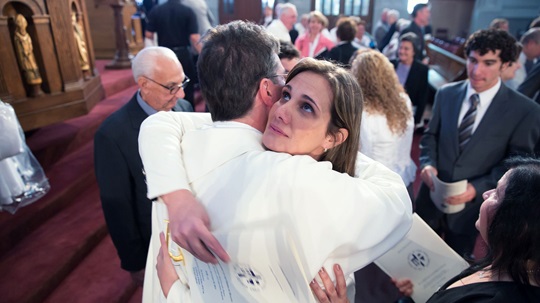
Last weekend, I sent my daughters to Sunday school at church. It’s the same church where my best friend was raped repeatedly in high school.
Our family begins worship together. The head pastor—not the one who was there, intentionally blind, when our youth pastor violated my friend—raises a hand of blessing over the kids.
“You are valuable because you are made in God’s image,” he says.
Afterwards, my five- and eight-year-old daughters make their way to class. They don’t look back.
I feel nervous every time they leave my side. Still, I’m glad to have them be part of this church.
I don’t send them away because I assume a different staff will—of course!—do better, or that the sins visited against my friend were an anomaly.
No, I choose to trust because I started asking my church prove it was worthy.
When Prominent Leaders Abuse Their Trust
Not long ago, the Mennonite Church USA had their annual conference. The unofficial theme?
Something no organization wants to print on promotional materials.
Over and over, the gathering repented of complicity in their most famous theologian’s sexual abuse.
According to the Religion News Service, John Howard Yoder may have victimized nearly 100 women during his tenure at a Mennonite seminary. He was forced out of that job, and later disciplined by the church, but without anyone revealing why he’d faced censure. Because of that cover-up, he probably victimized more women.
What makes Yoder’s violence all the more grotesque is the theology that made him—and his church—famous:
Pacifism.
When I first heard of Yoder and his crimes last year, my stomach turned.
I’ve come close to sexual violence before—my siblings were both assaulted, one of them also within a Christian organization. But I still longed to believe church was a safe haven.
But if those known for preaching peace were capable of such violence, I don’t have that luxury.
Is the only alternative, then, to mistrust everyone?
I’ve grappled with that question all year.
Facing the Past Is Never Easy
Last summer, working on a memoir, I sorted through high school memories. I’d known about my friend’s rape for years, but hadn’t really confronted it.
As I typed up memories, I realized I’d never grieved any of it.
Unbeknownst to me, the church dealt with the abuse decently. It called the police, though the case never went to court. Because there was no conviction, leadership were advised by an expert in church abuse not to discuss the wound publically.
But I didn’t know any of that. I’d never talked to anyone at the church about my anguish.
As I wrote, I realized I had to start.
I have been at this church a quarter-century. Its youth group was my first Christian community. I was married there, baptized both my kids there.
I loved the church so much I didn’t want to think about my hurt.
But bitterness and cynicism had become a regular companions in the sanctuary even before I recognized their source.
If I didn’t speak up, or the church didn’t take me seriously, we were through.
Hands trembling, I made an appointment with our senior pastor.
I couldn’t give away trust for free anymore.
No Church Is Immune
Is this not the position many Christians find ourselves in? We watched the implosion of the Catholic church after devastating abuse. Then, Boz Tchividjian of G.R.A.C.E (Godly Response to Abuse in the Christian Environment) predicted that the Protestant church would have even farther-reaching scandals.
As I’ve grappled with my anger, I’ve realized that true community is only possible with complete honesty. I can only chip away at mistrust if the church reciprocates with accountability.
Here’s what that looks like for me:
I’ve come to terms with the prevalence of sexual abuse.
My shock over John Howard Yoder’s crimes revealed lingering naiveté. Impressive credentials don’t keep anyone from causing grievous harm.
No church is immune. Period.
God recognizes our naiveté about human nature. As Dr. Diane Langberg put it, “…we think we know people. God says we do not. He says we do not know ourselves.”
I’m done with wishful thinking. My kids deserve better.
People—me included—are uncomfortable talking about sexual abuse. I need to bring it up anyway.
For years, I shied away from discussing my youth group frankly at church. I wasn’t the primary victim; I was afraid of distressing others; and I wasn’t sure my experience would be taken seriously.
But as I’ve confronted the issue, the more I recognize others at my church grieve too.
Sexual abuse destroys trust and shames everyone involved. The only remedy is communication.
In addition, blunt discussions protect our children. In their FAQ, GRACE describes how to encourage church kids to disclose abuse. The main advice? Talk about sexual abuse. Mention it in sermons. Conduct classes for kids and parents.
Sexual abuse is going to happen, even in good churches, unless we’re all intentional about confronting it.
Real peace comes from speaking up.
I had a hard time sleeping before meeting with my pastor.
But when he met my eye across the table, listened to my toughest questions, and aded my concerns, I felt the bitterness leach out of my bones.
Before I made my appointment with him, it felt easier to keep mum. I worried about ruffling feathers; I worried about him blowing me off. But the conditional peace I had before speaking up was not the deep shalom of God.
Healing is an ongoing process.
Speaking to my senior pastor was only a first step.
Picking up my eldest from Sunday school, I pulled aside the children’s ministry director, and asked if we could grab coffee later. I told her I wanted to talk about current policies in light of our church’s history.
She nodded enthusiastically. “We need lots of people in this conversation.”
One-off discussions aren’t enough—for me, or for the church. No: pursuing a church where all kids are truly valued is an ongoing discipline for us all.
The Truth Makes All Things New
My church attendance was spotty the year I wrestled with grief. But after I felt my anger and mistrust aded, a hard knot in my chest loosened. I decided I was ready to attend more regularly.
Not long after, my family sat in the balcony as our worship band sang Gungor:
You make beautiful things out of the dust…
You make beautiful things out of us.
Overlooking the congregation, I wept. Yes, we had been ground down by trauma and betrayal.
But God was beginning to make something new out of our mourning.
A version of this essay originally appeared at Christianity Today’s website.














 Peace is a tough-britches choice
Peace is a tough-britches choice